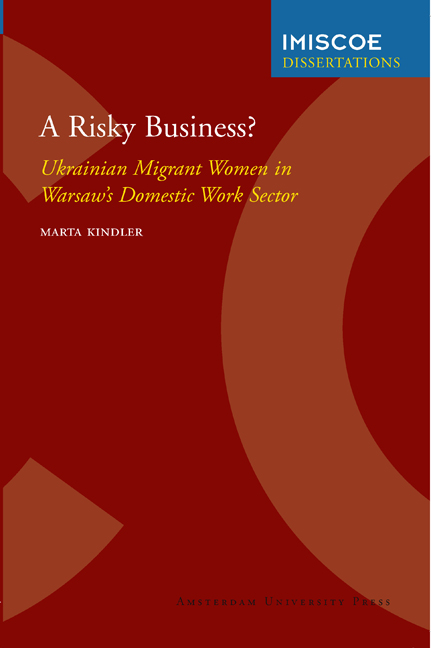Book contents
- Frontmatter
- Contents
- Acknowledgements
- 1 Ukrainian Migrant Women, Migrant Domestic Work and Risk
- 2 Risk, Migration and Migrant Domestic Work: Selected Theory and Research Review
- 3 Theoretical Approach and Research Methodology Applied in this Study
- 4 Ukrainian Migrant Women’s Images of Risk
- 5 Legal Risks of Migration and Legal Risk-Balancing Strategies
- 6 Risks and Risk Strategies in Migrant Domestic Work
- 7 Familiar Risk: Ukrainian Women in the Polish Domestic Work Sector
- Notes
- References
- Other IMISCOE Titles
2 - Risk, Migration and Migrant Domestic Work: Selected Theory and Research Review
Published online by Cambridge University Press: 20 January 2021
- Frontmatter
- Contents
- Acknowledgements
- 1 Ukrainian Migrant Women, Migrant Domestic Work and Risk
- 2 Risk, Migration and Migrant Domestic Work: Selected Theory and Research Review
- 3 Theoretical Approach and Research Methodology Applied in this Study
- 4 Ukrainian Migrant Women’s Images of Risk
- 5 Legal Risks of Migration and Legal Risk-Balancing Strategies
- 6 Risks and Risk Strategies in Migrant Domestic Work
- 7 Familiar Risk: Ukrainian Women in the Polish Domestic Work Sector
- Notes
- References
- Other IMISCOE Titles
Summary
In the vast body of research on risk, it is rare to encounter a study on migration risks. The notion of risk has not been used extensively in migration studies, either, and even less so in research concerning migrant domestic work. This is surprising given the fact that migration very often is a gamble on a vector of unknowns. Migrants have to cross an international border, face the set of employment opportunities and work conditions in the destination country, and prove that they are capable of withstanding separation from home. Migrant domestic work seems to be especially risk-loaded due to its largely undeclared character, low wages, low social status and no upward occupational mobility.
Analysing migration through the risk lens
Why analyse migration from a risk perspective? The notion of risk has already been used in migration theories and research, but the work done so far has almost solely focused on economic aspects of migration. It is therefore of interest to use the notion of risk as an analytical tool, on the one hand, to understand the aspects of migration experience that go beyond financial considerations and, on the other hand, to find out what risk means for migrants. Is there potential ‘space’ for risk analysis in the current research on migrant domestic work? To find an answer to this question I provide an insight into the notion of risk, sociocultural risk theories as well as the role of the concept of risk in migration theory.
The notion of risk
When the notion of risk was first used in the late Middle Ages it was a spatial concept, related to voyage and maritime insurance. At that time, risk was understood as a phenomenon beyond human control: a natural disaster or a divine act. The meaning of risk changed with industrialisation in Europe in the seventeenth and eighteenth centuries, when it came to be seen as a result of human action, an event that is calculable and therefore manageable. The twentieth century saw a redefinition of risk and attempts to control it, largely due to new scientific and technological developments. There appeared risk analysis institutes and agencies dealing with occupation and consumer safety, as well as traffic and environment safety (Giddens 1999).
- Type
- Chapter
- Information
- A Risky Business?Ukrainian Migrant Women in Warsaw’s Domestic Work Sector, pp. 19 - 48Publisher: Amsterdam University PressPrint publication year: 2012



